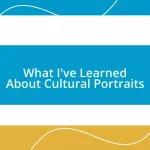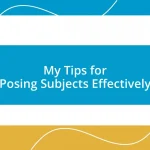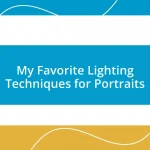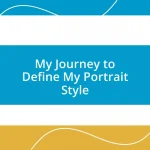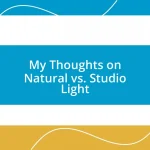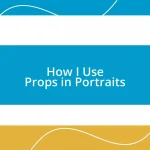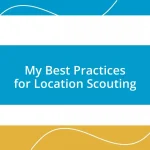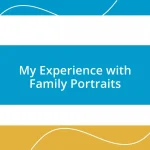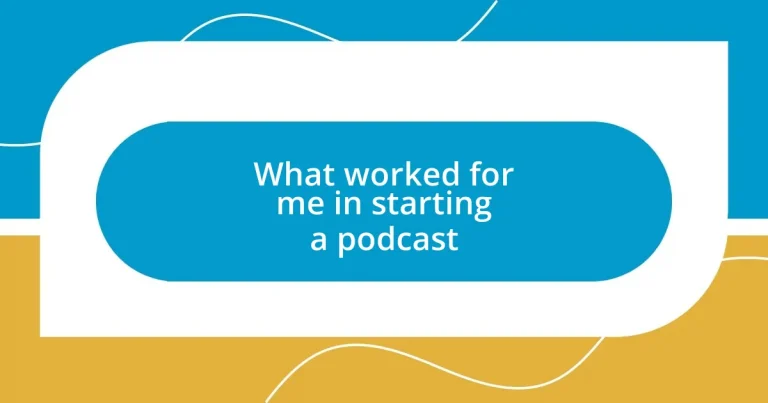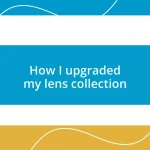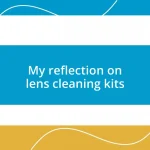Key takeaways:
- Quality audio equipment is essential for a professional-sounding podcast and boosts creator confidence.
- Understanding your audience through feedback allows for content that resonates and fosters a deeper connection.
- Storytelling and episode planning, including adapting to audience cues and current events, enhance listener engagement.
- Building relationships and strong branding through visuals and community engagement is crucial for podcast success.
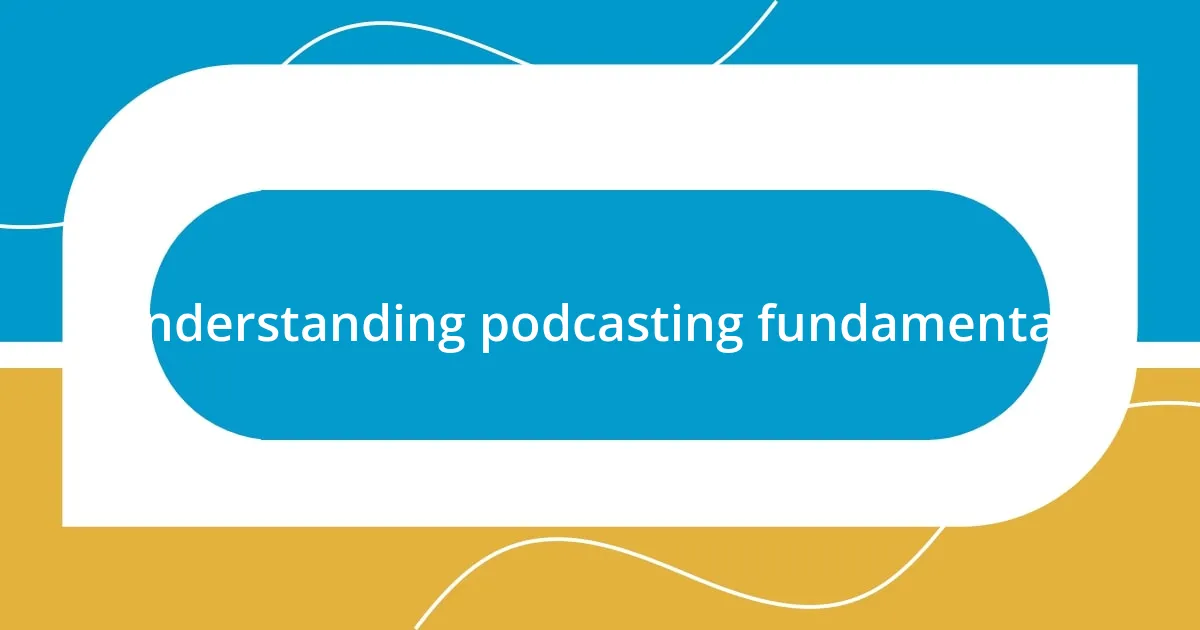
Understanding podcasting fundamentals
Diving into podcasting requires a grasp of its foundational elements. I remember the first time I sat down to create my podcast; the excitement was palpable, but so was my apprehension. What tools do I really need to get started? I quickly learned that quality audio gear makes a significant difference, not just for sound but for the confidence it gives you as a creator.
Understanding your audience is another core principle. I vividly recall a moment when I missed the mark with an episode topic, and the drop in engagement was a wake-up call. Have you ever felt disconnected from what your audience truly wants? By actively seeking feedback and tuning into their interests, you develop content that resonates deeply, fostering a stronger connection.
One of the most enlightening aspects for me was learning the importance of storytelling in podcasting. Initially, I thought just talking was enough, but I soon discovered that weaving narratives captivates listeners. Have you found yourself glued to a story that unfolds gradually? By structuring your episodes around a compelling narrative arc, you not only engage your audience but also create a memorable experience that keeps them coming back for more.
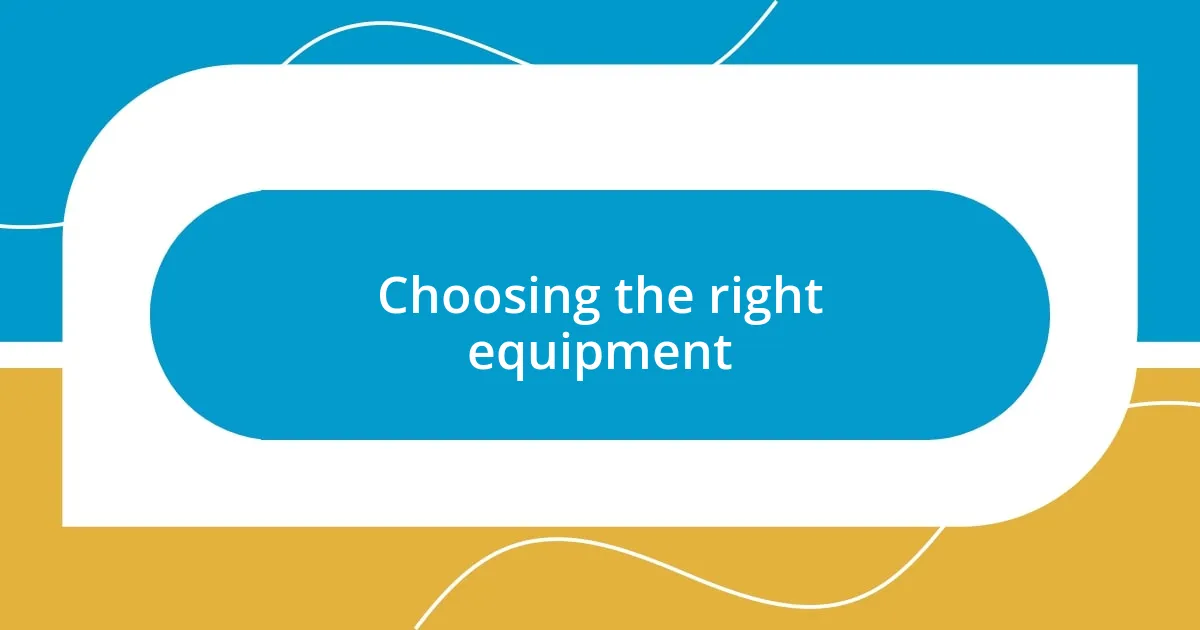
Choosing the right equipment
Choosing the right equipment can make or break your podcasting experience. I remember my first recording session with a cheap microphone – the sound was so poor that I almost gave up before I started. Investing in good quality audio gear was a game-changer for me. It not only improved sound clarity but also boosted my confidence as a host.
When selecting your equipment, here are some essentials to consider:
- Microphone: A dynamic or condenser microphone tailored to your voice can dramatically enhance audio quality.
- Headphones: A decent pair of closed-back headphones helps you monitor your audio without any echo or bleed.
- Audio Interface: This connects your microphone to your computer, ensuring sound is captured accurately.
- Pop Filter: It reduces unwanted plosives, making your vocal delivery smoother.
- Recording Software: Look for user-friendly options like Audacity or GarageBand to help with editing.
I truly believe that the right tools can elevate your content and help you express your creativity to the fullest.
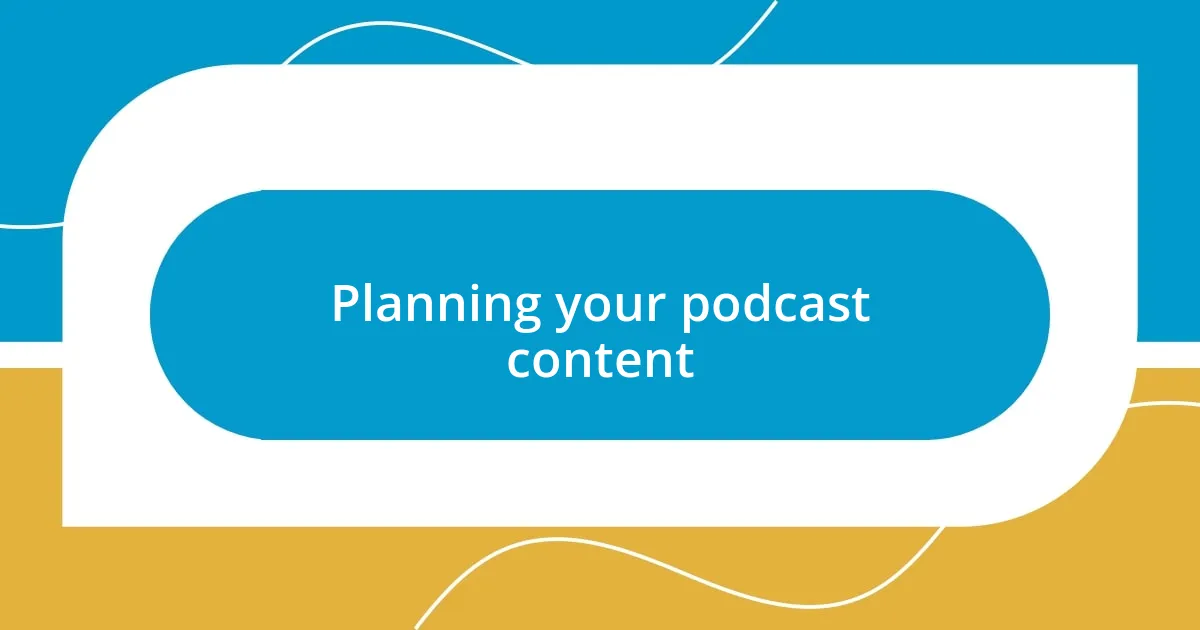
Planning your podcast content
Planning your podcast content is where the magic truly starts to happen. I still recall the thrill of brainstorming ideas for my first series. It felt like creating a recipe, mixing various elements—topics, formats, and guest appearances—into something unique and exciting. What has worked for me is mapping out themes for several episodes in advance. It took some trial and error, but now I keep a content calendar that helps me stay organized and focused on my listener’s interests.
One crucial aspect that I realized early on was the importance of flexibility. While I had a well-thought-out plan, there were times I had to pivot based on current events or feedback. Have you ever had a moment where a spontaneous idea led to a fantastic episode? I remember one instance where a trending topic sparked an impromptu discussion with a friend, and it turned into one of my most downloaded episodes! Embracing your audience’s cues can lead to richer content that resonates more with your listeners.
Also, considering the length and format of your episodes can make a huge difference. For example, I’ve experimented with both single-host narratives and panel discussions, and each brought its own flavor. What length do you find works best for you? I’ve learned that shorter, focused episodes can be just as impactful as longer, in-depth discussions, depending on the topic and audience preferences.
| Content Planning Elements | My Insights |
|---|---|
| Episode Themes | Mixing different formats keeps it engaging. |
| Flexibility | Pivoting based on real-time feedback can enhance relevance. |
| Length & Format | Short vs. long: each has its own value depending on the topic. |
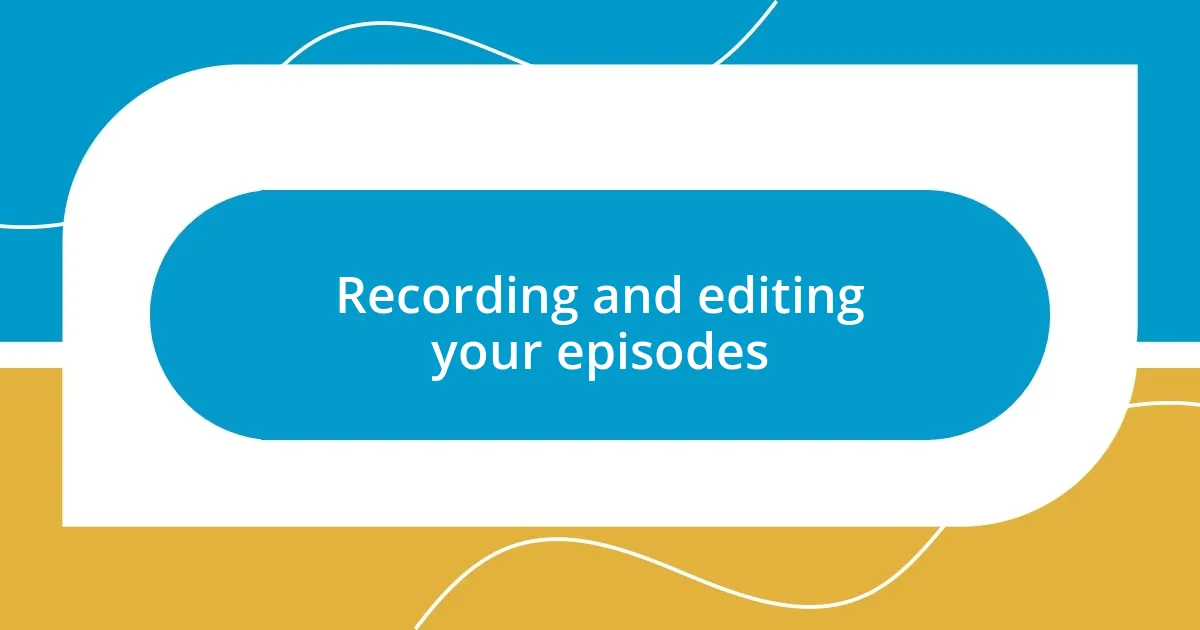
Recording and editing your episodes
Recording your episodes is where the real fun begins, and trust me, it comes with its own set of challenges. I vividly recall my early days, hunched over my microphone, overly conscious of every little sound. I learned that finding a quiet space was crucial; it improved my recording quality dramatically. How can you focus on delivering content if you’re distracted by background noise, right? A cozy little corner in my apartment became my sanctuary for recording, and I was amazed at how much it helped me sound more professional.
When it comes to editing, having the right mindset can make a world of difference. I used to dread the editing phase, feeling overwhelmed by all the cutting and adjusting. But then I started viewing it as an art form—a way to enhance the story I was telling. For me, trimming out the fluff and focusing on what truly resonates with listeners felt liberating. Have you ever experienced that moment of clarity when a great piece of content falls into place? It’s like piecing together a puzzle, and it’s incredibly satisfying when you hear the final product come together.
Lastly, let’s talk about the learning curve of using editing software. Initially, I fumbled around with audio levels and effects, but the more I played with the tools, the more comfortable I became. I still remember the excitement of finally mastering how to lower pesky background noise; it felt like I had achieved a small miracle! If you’re feeling apprehensive about the technical side, I encourage you to keep experimenting. With every episode, you’ll build your skills and confidence. Remember, every podcaster starts somewhere—embracing the learning journey can lead to unexpected joys!
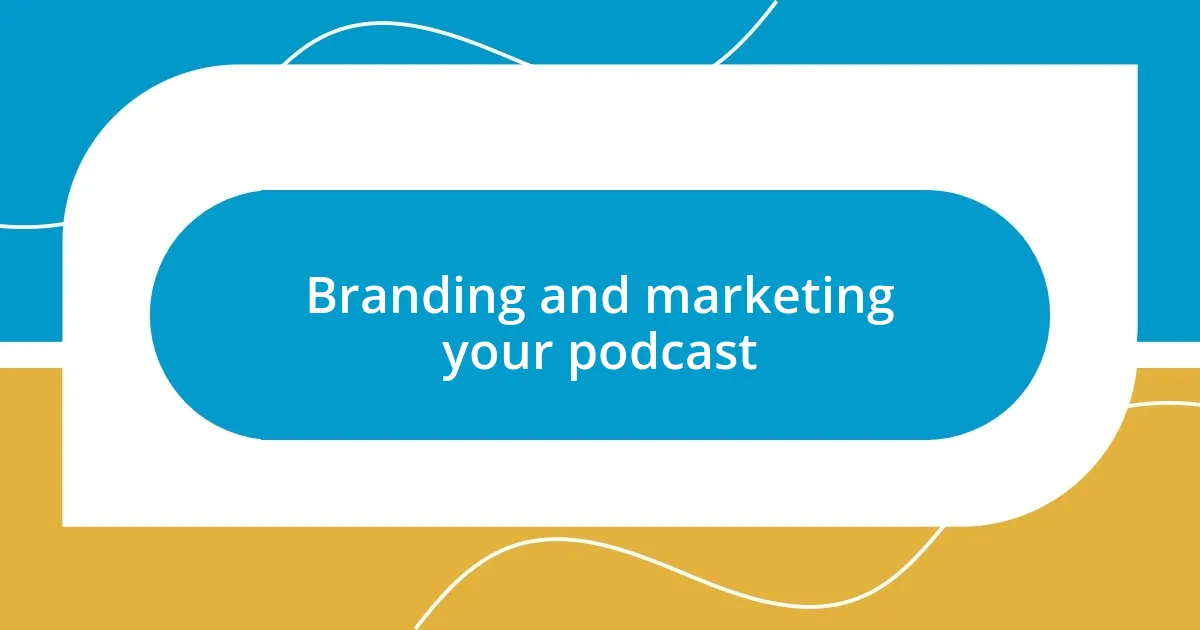
Branding and marketing your podcast
Branding your podcast is like creating a personality that resonates with listeners. I remember the moment I decided on my podcast name; it was a mix of excitement and a touch of anxiety. It’s crucial to choose a name that captures the essence of your content while being memorable. Have you thought about how your podcast name might reflect your mission or themes? I found that a catchy, meaningful name helped in sparking curiosity, leading to more organic shares and discussions.
Marketing your podcast goes beyond just posting on social media. I learned early on that building relationships is key. Engaging with fellow podcasters, responding to listener feedback, and joining online communities opened doors I didn’t expect. Have you ever connected with someone whose path aligned with yours? It’s those connections that can turn a one-time listener into a loyal fan. For me, attending virtual podcasting events and networking with others in the field became a game-changer; it felt like joining a family with a shared passion.
Creating consistent and visually appealing branding elements like logos, cover art, and promotional graphics has made a significant impact on my outreach. I had a friend help me design my logo, and that collaboration turned into a creative adventure that captured the spirit of my show. Have you noticed how professional visuals can elevate a podcast’s credibility? I certainly have; it’s incredible how a cohesive look can draw in an audience and present your podcast as a serious contender in a crowded space.
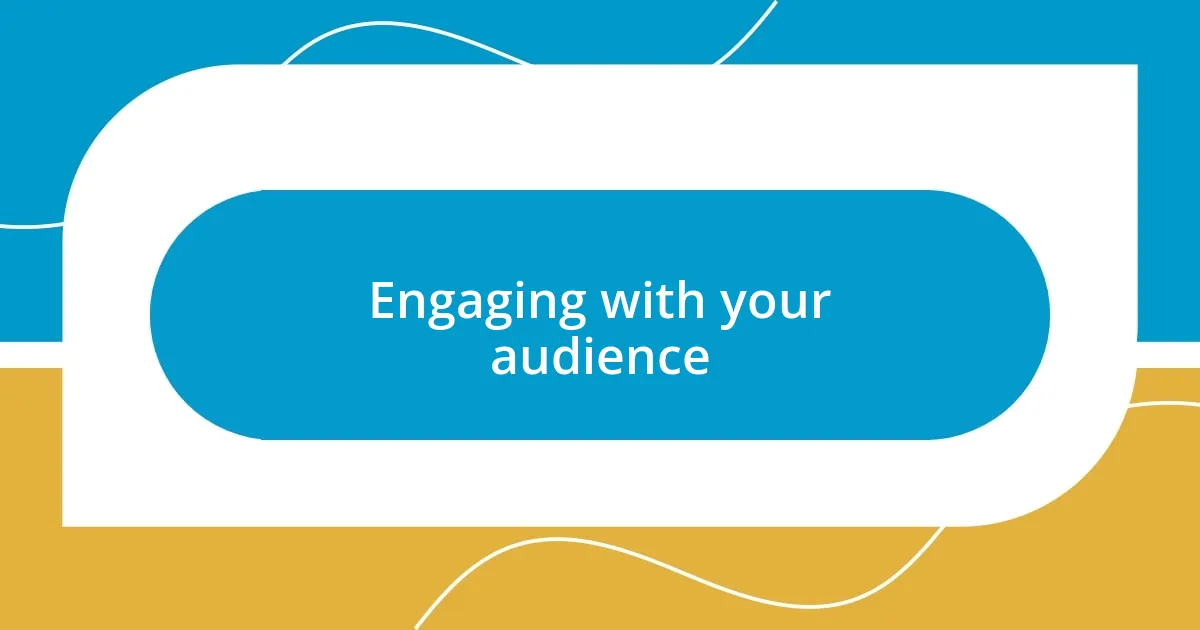
Engaging with your audience
Engaging with your audience is where the magic truly happens. I recall one instance when I spontaneously asked my listeners a question in an episode. Their responses flooded my inbox, creating a dialogue that instantly made me feel connected to them. Have you ever wondered how a simple question could open up a world of discussion? I found that listeners love to feel their voices are heard, and that made me rethink how I approach each episode.
Involving your audience through social media is another layer of engagement that can be powerful. I remember launching a poll on Instagram asking what topics they wanted to hear next. The responses surprised me, and diving into their interests not only sparked new episode ideas but also deepened my relationship with them. Have you considered how your audience can be a source of inspiration? By inviting their input, you make them feel like a crucial part of your podcasting journey.
Additionally, I learned that responding to feedback can transform the way you create content. One listener mentioned enjoying a specific segment, which encouraged me to explore that format more. It made me realize that constructive criticism is a gift. Have you taken the time to gauge your audience’s reactions? By embracing their feedback, you not only refine your podcast but also foster loyalty, making listeners feel invested in your show’s evolution.
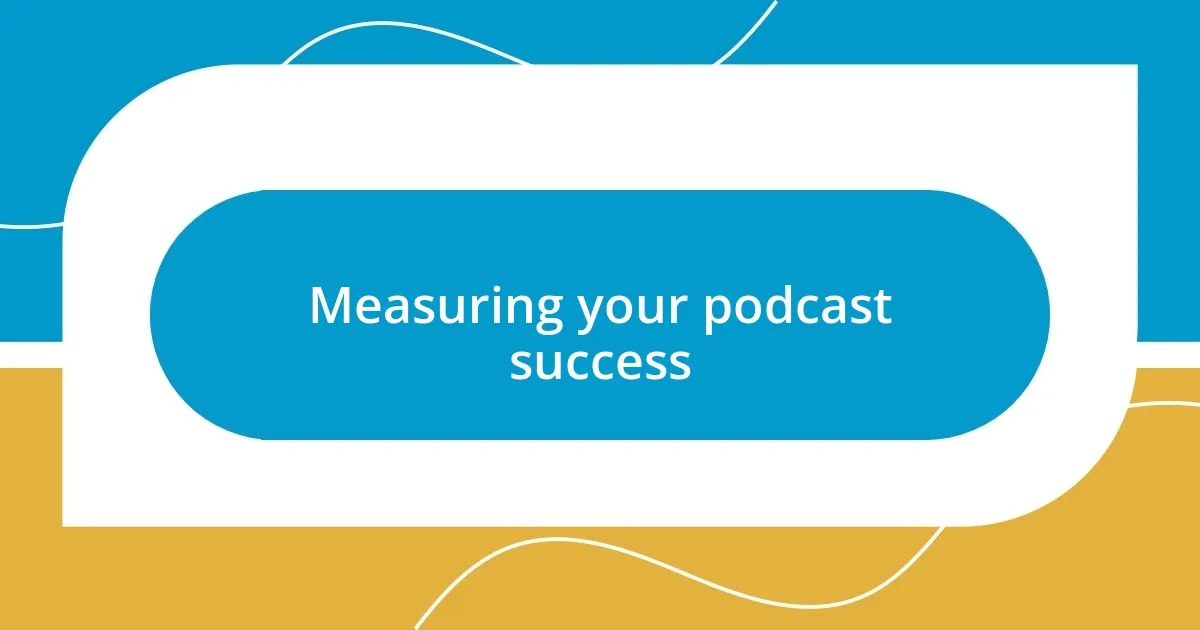
Measuring your podcast success
Measuring the success of my podcast has been a fascinating journey. At first, I was fixated on download numbers, but I quickly realized that true success is more nuanced. It’s about the conversations I have with listeners after they tune in. Have you ever reached out to a listener only to discover they were profoundly impacted by an episode? Those heartfelt moments are what truly signify success to me.
I also began tracking engagement metrics across different platforms. I remember celebrating after I saw a spike in social media interactions when I introduced a new format. It felt like a sign that my audience was genuinely enjoying the content. Have you ever noticed how a simple change can resonate so well with your listeners? It’s eye-opening to see that behind every download is a person who might want to join the conversation.
Feedback surveys became another crucial tool for measurement. I decided to send one out after my first season. The insights I received were invaluable! One listener shared that my episode on mental health made a significant difference in their life. Can you imagine the thrill of knowing your podcast had that kind of impact? This kind of measurable success, based on emotional connection and listener experiences, shifted my focus from mere numbers to nurturing a community.
